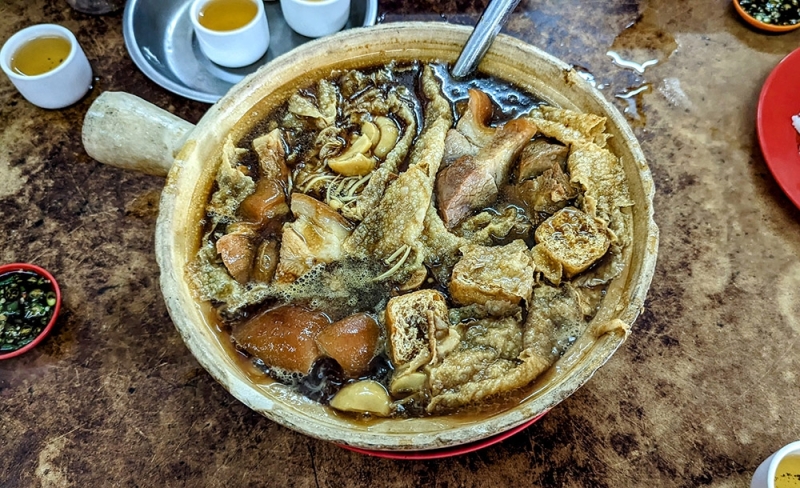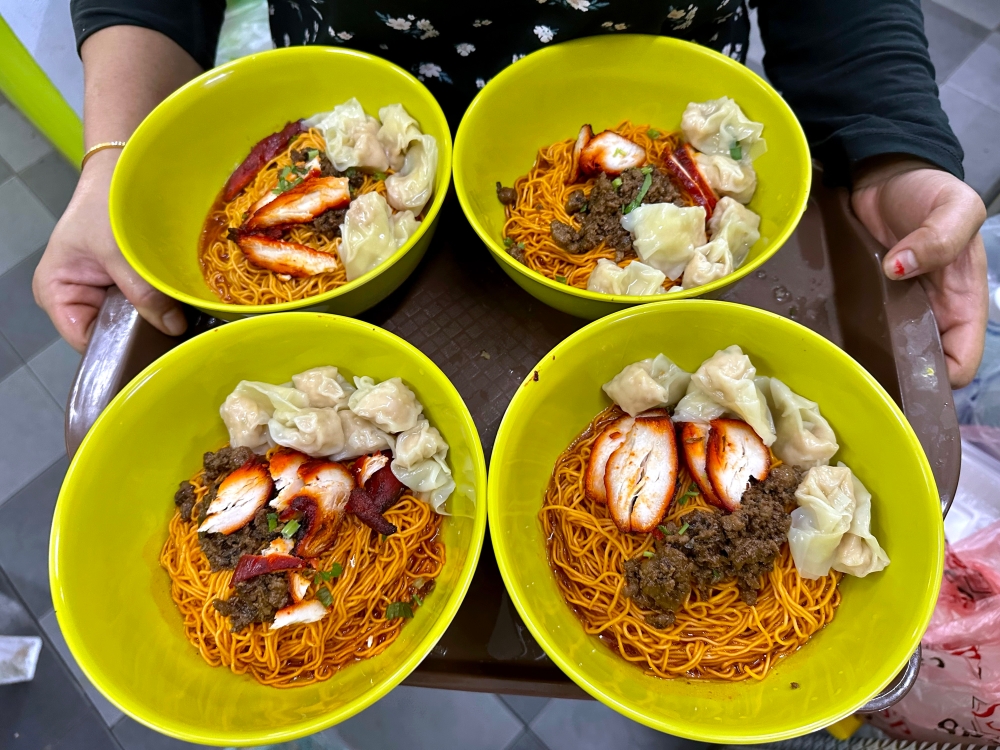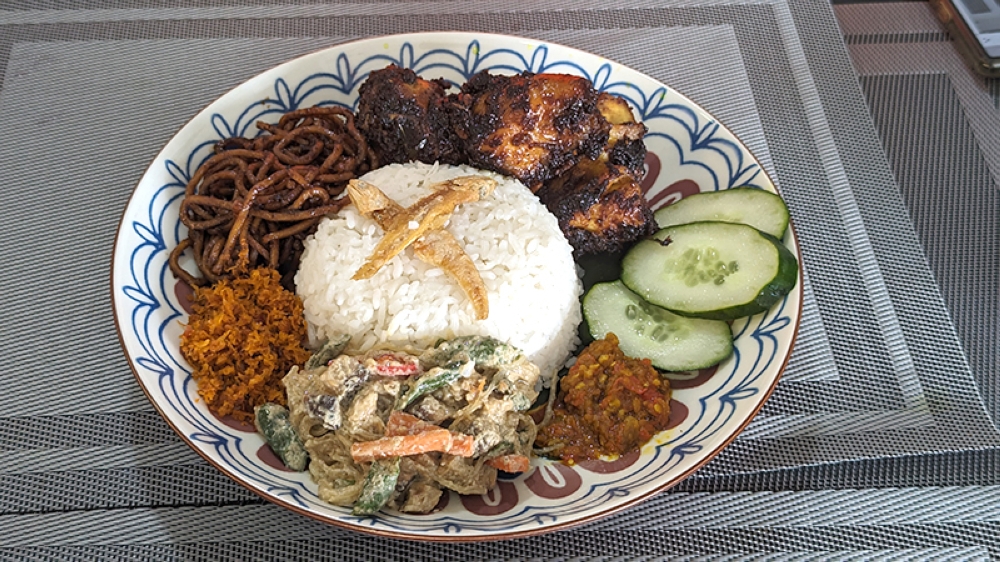‘Bak kut teh’ heats up online debate after newest heritage food list, but some say criterion should be on how ‘uniquely Malaysian’ the dishes are

One commenter said the pork ribs in a herbal broth served with steamed white rice originating from Klang deserves the spotlight as a 'born in Malaysia' food. — File picture by Ethan Lau
Saturday, 24 Feb 2024 1:13 PM MYT
above photo doesn't show 'real' bah-kut-teh - very messy - see following three:
Saturday, 24 Feb 2024 1:13 PM MYT
above photo doesn't show 'real' bah-kut-teh - very messy - see following three:
original b-k-t does have lettuce, coriander - just straight forward pork of all sorts including innards and tau-pok, Chinese mushrooms
the 'teh' in b-k-t does not stand for 'tea' as I too had originally misunderstood. It stands for the surname of a Chinese gentleman Mr 'Teh', who created the dish
KUALA LUMPUR, Feb 24 — Malaysians have been taking to social media to celebrate and debate 10 dishes that were added yesterday to a growing list of the country’s heritage food.
And as expected of a multicultural country that where Muslims make up more than 60 per cent of the population, the hottest topic as well as the most polarising dish centred on the inclusion of bak kut teh.
One commenter said the pork ribs in a herbal broth served with steamed white rice originating from Klang deserves the spotlight as a “born in Malaysia” food.
“Pleaseeeee. Of all the other menu here, Bak Kut Teh had the most Hoo Haa when it was first mentioned to be listed. Why should media down play this news now.
“Make it big and make it proud. Bak Kut Teh is 100% born in Malaysia,” @Kendogdoll posted on X, the platform formerly known as Twitter.
Another X user also spoke up in support of bak kut teh’s inclusion as a heritage food, noting that while its origins were ethnic Chinese, the dish did not originate from China and is not available there.
“Why does Bak Kut Teh deserve to be made a National Heritage?
“Because BKT comes from this region like Char Kuey Teow, Ngiu Chap, Har Mee, Hokkien Mee and Chicken Rice (already claimed by Singapore). All these foods are not available in Mainland China,” said @thelast_demigod.
Local artiste Francissca Peter shared the same sentiment and said that Malaysians should be proud of any dish as long it is original to Malaysia.
“We are proud Malaysians be it of Chinese, Indian or from any descent. We, born & bred Malaysians have always loved our beautiful multi-cultural,traditional foods & mixed marriages of all races that we've blended into. Proud dat dis is our beautiful Malaysia,” she posted on X.
KUALA LUMPUR, Feb 24 — Malaysians have been taking to social media to celebrate and debate 10 dishes that were added yesterday to a growing list of the country’s heritage food.
And as expected of a multicultural country that where Muslims make up more than 60 per cent of the population, the hottest topic as well as the most polarising dish centred on the inclusion of bak kut teh.
One commenter said the pork ribs in a herbal broth served with steamed white rice originating from Klang deserves the spotlight as a “born in Malaysia” food.
“Pleaseeeee. Of all the other menu here, Bak Kut Teh had the most Hoo Haa when it was first mentioned to be listed. Why should media down play this news now.
“Make it big and make it proud. Bak Kut Teh is 100% born in Malaysia,” @Kendogdoll posted on X, the platform formerly known as Twitter.
Another X user also spoke up in support of bak kut teh’s inclusion as a heritage food, noting that while its origins were ethnic Chinese, the dish did not originate from China and is not available there.
“Why does Bak Kut Teh deserve to be made a National Heritage?
“Because BKT comes from this region like Char Kuey Teow, Ngiu Chap, Har Mee, Hokkien Mee and Chicken Rice (already claimed by Singapore). All these foods are not available in Mainland China,” said @thelast_demigod.
Local artiste Francissca Peter shared the same sentiment and said that Malaysians should be proud of any dish as long it is original to Malaysia.
“We are proud Malaysians be it of Chinese, Indian or from any descent. We, born & bred Malaysians have always loved our beautiful multi-cultural,traditional foods & mixed marriages of all races that we've blended into. Proud dat dis is our beautiful Malaysia,” she posted on X.
We are proud Malaysians be it of Chinese, Indian or from any descent. We, born & bred Malaysians have always loved our beautiful multi-cultural,traditional foods & mixed marriages of all races dat we've blended into. Proud dat dis is our beautiful Malaysia. #SupportlocalfoodBiz
Some debated whether a dish that is considered as a national heritage must be able to be consumed by all races and religions.
But one commenter pointed out that mi kolok, also called kolo mee and jeruk tuhau, which were listed alongside bak kut teh, were hardly popular dishes with all Malaysians.
“I doubt more than half the population have eaten kolo mee or jeruk tuhau also. That's the point, national heritage food should be uniquely Malaysian, halal or not, consumed by all or not.
“Else we let Singapore claim bak kut teh and roti canai lah,” @bongkersz posted on X.
Heritage Commissioner Mohamad Muda Bahadin announced that 10 food items have been gazetted as Malaysian heritage foods in a Declaration of Heritage Object 2024 yesterday.

'Mi kolok' is a dry rice noodle dish from Sarawak. — Bernama pic
The items listed are:
1. Burasak is a rice dumpling cooked with coconut milk and wrapped in banana leaf. A delicacy of the Bugis, it is very popular in Johor.
2. Mi kolok is a dry rice noodle dish from Sarawak.
3. Nasi Ambeng is a Javanese dish of steamed white rice, chicken curry, beef or chicken rendang, bergedel, and serunding. Popular in Johor and Selangor.
4. Dodol Kukus Tahi Minyak is a popular Pahang-style dodol.
5. Kueh Lapis is a steamed layered kueh which apparently has Indonesian origins.
6. Kuih Karas is made of rice flour and a traditional kueh in Kedah.
7. Uthappam is a thick thosai with toppings, and is of South Indian origin.
8. Jeruk Tuhau is a pickled wild ginger from Sabah.
9. Bak Kut Teh is pork ribs in an herbal broth served with steamed white rice originating from Klang in Selangor.
10. Air Katira is a cold drink very popular during Ramadan and made with Katira gum, evaporated milk and fruit.
Mohamad Muda said the food items were gazetted as heritage objects via the powers conferred to him by subsection 49(1) of the National Heritage Act 2005 [Act 645].

The items listed are:
1. Burasak is a rice dumpling cooked with coconut milk and wrapped in banana leaf. A delicacy of the Bugis, it is very popular in Johor.
2. Mi kolok is a dry rice noodle dish from Sarawak.
3. Nasi Ambeng is a Javanese dish of steamed white rice, chicken curry, beef or chicken rendang, bergedel, and serunding. Popular in Johor and Selangor.
4. Dodol Kukus Tahi Minyak is a popular Pahang-style dodol.
5. Kueh Lapis is a steamed layered kueh which apparently has Indonesian origins.
6. Kuih Karas is made of rice flour and a traditional kueh in Kedah.
7. Uthappam is a thick thosai with toppings, and is of South Indian origin.
8. Jeruk Tuhau is a pickled wild ginger from Sabah.
9. Bak Kut Teh is pork ribs in an herbal broth served with steamed white rice originating from Klang in Selangor.
10. Air Katira is a cold drink very popular during Ramadan and made with Katira gum, evaporated milk and fruit.
Mohamad Muda said the food items were gazetted as heritage objects via the powers conferred to him by subsection 49(1) of the National Heritage Act 2005 [Act 645].

Nasi Ambeng is a Javanese dish of steamed white rice, chicken curry, beef or chicken rendang, bergedel, and serunding. Popular in Johor and Selangor. — Picture by Ethan Lau





For 3R Supremacists, it is absolutely unacceptable for a non-Halal pork dish that has it's origins in China to be considered a Malaysian heritage.
ReplyDeleteBKT is not from China, never ever - homegrown
DeleteHow could you be absolutely sure that this dish originated from China?
DeleteThe recipe came from Fujian province, perhaps with minor creative editions among Hokkiens in Singapore and Malaysia.
DeleteGo visit rural Fujian. You can still find an almost identical dish there, except some ingredients are more common in Malaysia and Singapore or unavailable in Fujian.
Wakakakaka…
DeleteKnow-nothing fart!
How much differences r nasi lemah differed from nasi berani?
Ooop…. They r rice thus is one copied from the other!
You are just WuMao crap
DeleteA better crap than u who r using know-nothing farts to spill lies!
Deletehttps://www.nlb.gov.sg/main/article-detail?cmsuuid=d403ac22-9997-45bf-a65f-114d3cea47ab#:~:text=Bak%20kut%20teh%20is%20believed,region%20in%20the%2019th%20century.
Delete"Bak kut teh is believed to have originated from China’s Fujian province."
Singapore makes no claim that Bak Kut Teh ( which I have tasted in Singapore back in the 1960s) is unique to Sing or Malaysia, is definitely more credible than any Malaysian claims.
Sing has never been a BKT centre - it has BKT that is different from the Malaysian variety - no herbs in its soup, useless taste - I have taken it, and my Sing relatives admitted that Sing has no BKT history nor treasure
DeleteThe TRUE originality of BKT can be traced from Klang district.
DeleteIt was the original cheapo combination of herds & pork to heal the overworked body of those coolies under the pommie administration & the heat/humidity of the land!
Know-nothing mfer, u truly don't read deep & wide to justify yr fart of inconsequential!
DeleteCare to point out which tradtional/conventional Fujian pork dish is cooked in the similar &/or modified ways vis-a-vis BKT?
Separate halal from non halal.
ReplyDeleteAin't they now?
Delete